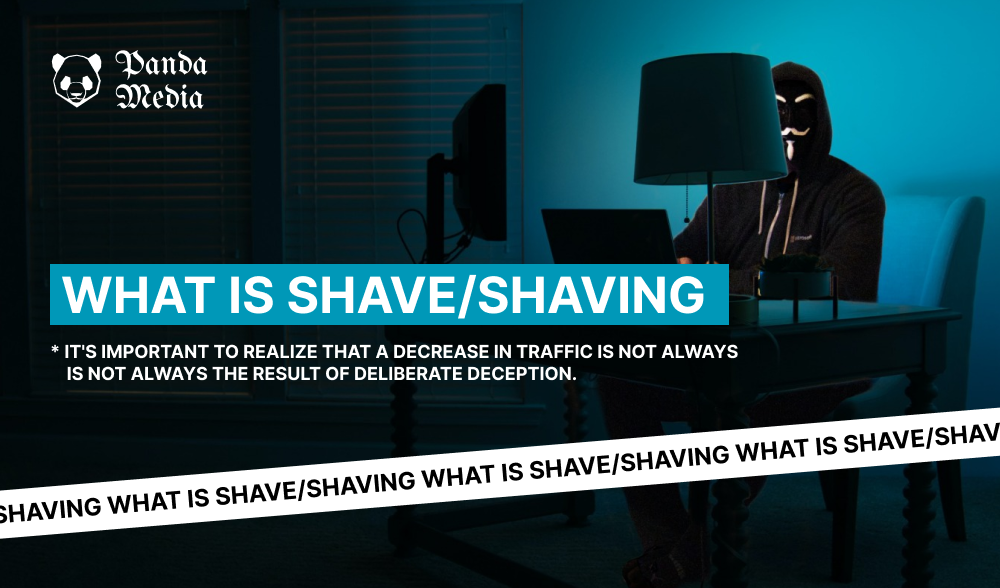In the world of affiliate marketing, we face two key challenges: identifying a target audience to advertise to and avoiding situations where your efforts are not appreciated, known as “shaves”. Let’s say you’ve found a great strategy, launched an ad campaign, and started attracting visitors. But all of a sudden you find that you’ve only been credited with half of the results or even less. The manager can explain it by various reasons: from violation of the rules of the affiliate program to inattention when reading the terms and conditions of the offer. If you are faced with such explanations, most likely it is a “shave”. So how can you avoid being cheated? In this article, we will go into detail about what a shave is in the context of traffic arbitrage, how to recognize it, and how to deal with it.
What is shave/shaving
In the field of internet traffic arbitrage, there is a practice called “shaving”. This is when an affiliate program or advertiser deliberately hides information about a part of conversions or traffic from a webmaster. The word “shaving” comes from the English word “shave”, which means “to cut”. In such cases, dishonest companies “cut off” a share of the profit from conversions, keeping it for themselves.
Example: a webmaster receives a notification of an order confirmation from a customer, but in the affiliate program system this order is suddenly marked as “canceled” or “not confirmed”. The webmaster is not told the reason for the cancellation, and the affiliate program keeps the money for that order.
Who does the shaving?
In normal cases, young affiliate companies and new advertisers try to save money on payments to webmasters, which allows them to increase their profits. However, this approach is rare in CPA networks, because for affiliate companies the use of dishonest methods is tantamount to collapse. Arbitrageurs quickly recognize the deception, report it to their colleagues, and move on to competitors. Advertisers also try to avoid fraud, because there are not so many professional webmasters on the market.
Signs of affiliate shaving
To find out if your affiliate program is shaving, you should carefully analyze statistics and monitor changes in key indicators. Here are the main signs you should pay attention to:
- A significant decrease in your approval rate. If your rule used to stay at 80% and suddenly dropped to 30%, it could be a sign of shaving. However, it’s worth remembering that changes in rules aren’t always due to shaving. They can be caused by changes in the settings of your target audience or the ineffectiveness of new advertising materials.
- A drop in the performance of the offerer. If you notice a strong decrease in the conversion rate of an offerer, compare its indicators in different CPA networks. If everything is normal in other networks, and you are experiencing problems, it may indicate shaving.
- Differences between the statistics of the affiliate program and third-party tracking. If you use external tools to track traffic, compare their data with the statistics in the affiliate program. Shaving can be if the stats in your tracker are higher than in the CPA network.
- Deterioration of traffic quality. This indicator is relevant for those who use their traffic sources. If you used to receive a stable number of transitions and conversions, and now they have decreased, it may be a sign of deception.
- If the number of conversions does not change, but the number of leads decreases. In this case, shaving is obvious.
Before you start working with a new affiliate program to understand if shaving is happening in it, it is recommended:
- Research reviews. Read reviews on forums, social media groups, and review sites. If you can’t find information, you can start discussions and ask questions of other marketers.
- Make a test order. Check if it will be counted by the affiliate program.
- Check for double redirects. Sometimes affiliate programs cut off leads, arguing that it is a mismatch of geography. That’s why it is important to check the lending of the offerer before you start working. If a double redirect is detected, it is better to clarify the reasons with the affiliate program manager or choose another platform.
Ways to shave
It is important to realize that a reduction in traffic is not always the result of deliberate deception. It is common to distinguish between two types of such traffic reduction.
Deliberate shave
This is when an affiliate intentionally cheats on its webmaster. Intentional cheating includes situations when an affiliate:
- Unregistered leads: A customer makes a purchase request, but this information is not displayed in the webmaster’s statistics. As a result, the advertiser and the affiliate program benefit, and the webmaster is left with nothing.
- Conversion cancelation without reason: The webmaster is informed that the customer did not take the required action and cancels the counted conversion.
- Fraud Allegations: The affiliate may reject some or all leads, claiming that all traffic is fraudulent.
- Failure to meet the requirements of the offer: The webmaster may be told that leads do not meet the geographical requirements of the offer.
- Blocking an account without grounds: Such blocking can be used as a way of not paying the webmaster.
- Changing the terms of the offer: Affiliate programs can unilaterally change the terms of the agreement, often to the detriment of the webmaster, for example, by reducing the amount of payments.

Unintentional reasons for lower conversion rates
A decrease in effectiveness does not always indicate deception. For example, a decrease in conversions can be caused by a glitch in the advertiser’s software. But this is not the only possible reason for changes in statistics:
- Technical failures of a CPA network. Although it is rare, it is possible.
- Outdated tracking code. Some browser extensions block it, because of which the user is not counted in the statistics, even if he made the desired action.
- Antivirus software. It can remove the affiliate ID from the link, as a result of which the action performed by the user is not registered as a conversion.
- Delay in displaying statistics. For example, the traffic was on January 20, but the data came only on the 24th. This can create a false impression of unreliable data.
- Failure to comply with the terms of the affiliate program. Newbies in arbitrage often do not carefully read the terms and conditions and use inappropriate channels for traffic, because of which leads are canceled.
- Changes in the offender’s landing page. For example, after an update, the design may suffer, and traffic will not lead to purchases due to a low-quality landing page.
- Inconsistency of the offer in the advertisement with the information on the landing page. This often happens when arbitrageurs try to attract users by improving the terms of the offer. Users, having seen the real conditions, leave.
Before accusing the affiliate program manager of dishonesty, you should carefully check all the indicators and pages. Perhaps the problem lies in your actions or the advertiser’s work.
Advice on how to avoid shaving for webmasters
First and foremost, the webmaster must keep a close eye on all changes in the statistics. If you are sure that the problems are not on your side, contact your account manager.
If you notice that your comments or call center call records have disappeared, it may indicate that you are being scammed. It’s not normal for some leads to have comments and recordings while others don’t.
We don’t recommend directing traffic directly to a link from an affiliate program. It’s better to invest in hosting to customize the API and logging to your liking. This will protect you from being scammed and allow you to use the necessary metrics.
Test the system by sending a real, not fake lead. A simple way is to place an order in the name of a friend or relative. This will show the quality of the advertiser’s product, and the speed and correctness of the accounting of the lead.
Use Your Landings. This avoids built-in cheating code and gives you the freedom to change the design as you see fit.
Connect an external tracker. It will help to quickly identify any affiliate fraud and check the quality of traffic.
Request verification of canceled leads. If you have doubts about cancellations, ask the affiliate program for call recordings to independently assess the quality of lead processing. Refusal to provide such information may be a sign of deception.
What a CPA network should do to increase the level of trust
The basic rule is that a CPA network should prioritize the interests of its affiliates over its own. It is ideal if there are affiliate support programs. For example, sometimes it happens that because of the protracted performance checks between the affiliate network and the advertiser, arbitrageurs have to wait a long time for payment. In such cases, CPA networks should go along with it, offering arbitrageurs compensation in the form of additional bonus points, which they can use to promote their offers.

Regularly perform diagnostics of the network to prevent technical problems. Problems in the work of the CPA network can lead to a decrease in the approval of applications and, as a result, to a reduction in the arbitrageur’s income.
It is important for affiliate programs to pay attention to the following aspects:
- Check the accessibility of the site pages. This can be done through services such as WAVE 3.0 Accessibility Evaluator or FAE Accessibility Test.
- Code validation is critical because even one incorrect character can have serious consequences. The Markup Validator Service W3C Markup Validator Service can help you validate the code.
- Examination of the offerer’s landing page before it is placed in the catalog. You need to make sure that the landing page is displayed correctly in different browsers.
If an affiliate program suspects fraud on the part of a webmaster, a conversation should be held first, rather than immediately blocking without explanation. In case of non-systematic violations, the manager should clarify the situation, as the webmaster may not be familiar with some of the rules. In any case, blocking is a last resort.
In addition, it is necessary to ensure the transparency of all reports. Some CPA networks, for example, provide records of conversations and allow you to see comments on leads. Quality technical support is also important. Webmasters should be sure that they can contact their CPA network at any time for clear and understandable answers.
Conclusion
Although shaving can cause problems for website owners, there is no need to be afraid of it. It can be easily detected by simply following the tips in this article. If you are careful when choosing an affiliate program, you probably won’t encounter obvious shaving at all.


